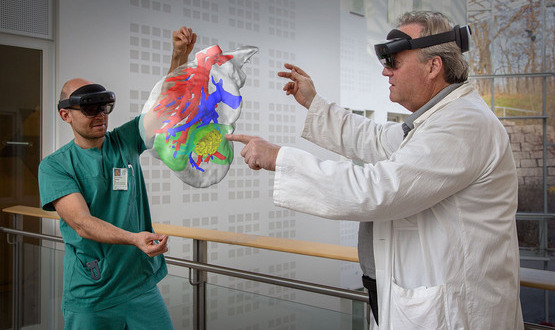HoloSurge, a groundbreaking four-year initiative uniting 14 top European tech and healthcare research leaders, has secured an impressive €8.9 million grant from Horizon Europe. This grant, one of the largest in EU history for research and innovation, will be utilized to enhance hologram technology for surgical planning.
The HoloSurge project plans to employ the grant to support the advancement of HoloCare’s interactive 3D hologram technology. This cutting-edge technology aims to minimize surgical complications for patients and enhance their overall outcomes by providing better spatial awareness for surgeons.
By generating real-time 3D holograms of a patient’s organs, the HoloCare software enables surgeons to meticulously plan and tailor surgeries to the individual anatomy of the patient. With improved spatial perception, surgeons can execute operations more efficiently and accurately, leading to reduced wait times, enhanced patient outcomes, and improved clinician well-being.
The technology is currently undergoing trials for liver surgeries at five hospitals in Europe, including Leeds Teaching Hospitals NHS Trust. Promising results from these trials have shown a 74% decrease in organ alignment time during surgery with HoloCare’s AR images compared to MRI scans.
Delivered through augmented reality headsets, the technology allows surgeons to manipulate the holograms for a comprehensive organ view. Moreover, collaboration and decision-making are heightened as the holograms can be accessed and interacted with by anyone wearing the headset, regardless of physical presence in the room.
Professor David Jayne, a surgery professor at the University of Leeds and Honorary consultant surgeon at Leeds Teaching Hospitals NHS Trust, expressed enthusiasm for the potential of HoloCare technology to revolutionize surgical care for cancer patients. The enhanced anatomical knowledge from the technology can facilitate more precise surgery and improved cancer outcomes.
Over the course of four years, HoloSurge partners will work on integrating the hologram technology into existing surgical workflows, ensuring regulatory compliance, clinical validation, and technical optimization for wider adoption in liver and pancreatic cancer surgeries.
Dr. Thomas Lango, chief scientist at St Olavs Hospital and SINTEF in Trondheim, Norway, a member of HoloSurge, highlighted the transformative potential of the HoloCare technology in minimally invasive procedures and collaboration among clinicians. The technology promises to enhance image-guided medical procedures and training for new experts.
Additionally, HoloCare aims to overlay holograms onto patients during surgery for improved accuracy and intraoperative navigation, indicating exciting future developments for the project.






